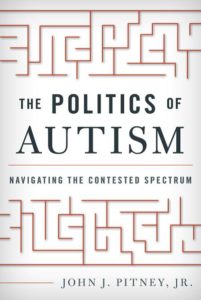“His fame spread to all the surrounding nations. He composed 3,000 proverbs and 1,005 songs. He could discuss trees, from the cedar in the Lebanon to the hyssop growing out of the wall; he could discuss wild animals, poultry, reptiles and fish. People from all nations came to hear the wisdom of Solomon, including kings from all over the earth who had heard of his wisdom,” 1 King 4:31-34
By Ron Sandison
As a theologian and prodigy with autism I have felt a close connection to King Solomon and a deep appreciation for his writings of Proverbs and Ecclesiastes. 2017, marked my 14th year as a professor of theology at Destiny School of Ministry. This past May, I presented a breakout secession on Autism & Ministry at the Summer Institute on Theology and Disability conference in Holland, MI. Asperger’s causes me to hunger for information and knowledge.
When God offered Solomon anything his heart desired—he asked for wisdom. Solomon prayed, “Give your servant a discerning heart to govern your people and to distinguish between right and wrong. For who is able to govern this great people of yours” (1 Kings 3:15)? God was pleased by his request.
In biblical archaeology and research information on historical events and figures are discovered by both external and internal evidence. External—artifacts, excavations, and documents confirming the accuracy of the biblical account. Internal—information gleamed from examining the Biblical narrative by applying a sound hermeneutical approach. Professor of hermeneutic at Oral Roberts University, Dr. Donald Vance, taught, “The Bible contains no unnecessary details.”
The five reasons I share follow the internal evidence from the biblical text. King Solomon reigned from 970-931 B.C. and the term Asperger’s was introduced in 1981 by Dr. Lorna Wing’s academic paper—due to this time-gap—internal is the only pliable method.
1. Solomon’s parents age difference.
Bathsheba was the granddaughter of one of David’s chief counsellors, Ahithophel. Her father, Eliam, was one of David’s thirty mighty men (2 Samuel 11:3 & 23:34). From this historical detail we discovery that Bathsheba was a lot younger than King David by roughly 28 years. The biblical text also indicates that David was in his fifties and Bathsheba was in her early twenties when King Solomon was conceived.
Research studies have shown that men over age 40 are twice as likely as men age 25-29 to have a child with autism, but only if the mother is under age 25. My dad, Chuck, was 40 years old and mom, Janet, was 24 when I was born. Like Solomon, my parent’s age difference was a contributing factors to autism.
2. Solomon’s literal/concrete thinking.
Those with Asperger’s and high functioning autism tend to be literal/concrete thinkers. Solomon’s thinking was unique by him being both a literal and lateral thinker. Maltese physician Edward de Bono in 1967 originated the term lateral thinking as solving problems through an indirect and creative approach, using reasoning that is not immediately obvious and involving ideas that may not be obtainable by using only traditional step-by-step logic.
Solomon’s literal/lateral thinking can be seen in the narrative account of “Two women claim to the same baby” (1Kings 3:16-28). In this narrative two prostitutes who live together stand before Solomon to settle a legal dispute concerning who is the mother of the living child. The first to present her case claims her housemate during the night switch her living baby with the other woman’s dead baby. The second woman states, “No! The living one is my son; the dead one is yours.”
Solomon brilliantly resolves the case by holding a sword before the baby and declaring, “Cut the living child in two and give half to one and half to the other.” The mother of the child alive filled with compassion cries out, “Please my lord, give her the living baby! Don’t kill him!” After the woman’s maternal response, Solomon gave his ruling: she is the mother of the living child. Solomon used Aspie’s logic to solve the case.
3. Solomon’s amazing wisdom and encyclopedia knowledge.
Children with Asperger’s often are referred to as little professors. Solomon is known as chacham mi’kol ha’adam, “wisest of all the men.” The Bible relates that kings from all over the world came to hear Solomon’s wisdom, which included not only Torah wisdom, but also wisdom in secular knowledge and science.
1 King 4:31-34 says, “His fame spread to all the surrounding nations. He composed 3,000 proverbs and 1,005 songs. He could discuss trees, from the cedar in the Lebanon to the hyssop growing out of the wall; he could discuss wild animals, poultry, reptiles and fish. People from all nations came to hear the wisdom of Solomon, including kings from all over the earth who had heard of his wisdom.”
I am sure Solomon like most people with Asperger’s could chat non-stop concerning his unusual special interests in cedars of Lebanon and all the exotic animals creeping around his palace and the Temple in Jerusalem.
4# Solomon’s perfectionism — all or nothing thinking.
Solomon writes in Ecclesiastes his great accomplishments, pleasures, wealth, and wisdom. Yet as a perfectionistic—all or nothing thinker—he realizes his great success is vanity, Solomon exclaimed, “I have seen all the things that are done under the sun; all of them are meaningless, a chasing after the wind” (Eccl. 1:14).
King Solomon excluded only one accomplishment from his list. Ironically, this is the achievement for which he is most known; the building of the Holy Temple in Jerusalem. The Temple was not meaningless because God called him to build it—the purpose of life is to fear and serve God (Eccl. 12:13).
5# Solomon’s common bond with those on the spectrum.
People with autism share a common bond; we on the spectrum can recognize a fellow Aspie. Solomon’s writing can provide insight for developing special interests for employment and relationships. My mom believed that by having me interact with typical children my own age I would learn social skills and by developing my talents I could gain independence and accomplishes my dreams. My mom was inspired by Proverbs 22:29 written by Solomon, “Do you see a man skilled in his work? He will serve before kings. He won’t serve before obscure men.”
In the 70’s and 80’s before the emphasis on inclusion in the classroom many children with autism and disabilities only learned skills to equip him or her to be employed as a janitor, grocery bagger, stock-boy, dishwasher, or pumping gas—serving before obscure men. My mom was determine that would not be me and decided to help me refine my disabilities into beautiful gifts.
As King Solomon said, “If the ax is dull and its edge unsharpened, more strength is needed, but skill will bring success” (Eccl. 10:10). By following Solomon’s advice from Proverbs and Ecclesiastes my mom was able to develop my gifts and teach me social skills enabling me to serve before kings. Even 3,000 years after his death, Solomon’s wisdom still provides practical insight for living.
***
 Ron Sandison works full time in the medical field and is a professor of theology at Destiny School of Ministry. He is an advisory board member of Autism Society Faith Initiative of Autism Society of America. Sandison has a Master of Divinity from Oral Roberts University and is the author of A Parent’s Guide to Autism: Practical Advice. Biblical Wisdom published by Charisma House. He has memorized over 10,000 Scriptures including 22 complete books of the New Testament and over 5,000 quotes.
Ron Sandison works full time in the medical field and is a professor of theology at Destiny School of Ministry. He is an advisory board member of Autism Society Faith Initiative of Autism Society of America. Sandison has a Master of Divinity from Oral Roberts University and is the author of A Parent’s Guide to Autism: Practical Advice. Biblical Wisdom published by Charisma House. He has memorized over 10,000 Scriptures including 22 complete books of the New Testament and over 5,000 quotes.
He frequently guest speaks at colleges, conferences, autism centers, and churches. Ron and his wife, Kristen, reside in Rochester Hills, MI, with a baby daughter, Makayla Marie born on March 20, 2016. You can contact Ron on his website spectruminclusion.com or email Ron at Sandison456@hotmail.com.
Other Art of Autism blogs you may like written by Ron Sandison:
Employed and Using my Gifts in the Mental Health Field
Tony Atwood gave me Insight into my Anxiety and Depression
How Telemarketing empowered me to be a better Advocate
Five Ways Autism Makes Me Unique
Five Things That I Fear as A Person with Autism
Five Ways Autism Makes me a Cool Dad









Ok, posthumous diagnosis has clearly gone too far.